First of all, I want to remind you that being a fanboy is not a good thing. And fanboys are just as common at Apple as they are at Android. But when you buy a smartphone, you're not just buying the list of hardware specifications. You are also picking up a brand that has its own philosophy in terms of products and user experience.
Hence, the purpose of this article is not to settle a "Samsung vs Apple, who's better?" debate. Rather, the idea is to allow more regular users or perhaps potential defectors who might be hesitant to switch sides, to make an informed choice between a Samsung smartphone and an Apple iPhone in 2021.
In order to do so in an objective manner, we are going to consider different criteria, weighing the pros and cons of each manufacturer on particular criteria. This article was written by an Android user, a OnePlus fanboy in remission, and former iPhone owner (up till the iPhone 6s Plus).
Summary:
iPhone or Samsung: Catalog range and prices
Apple offers a smaller and more expensive range of smartphones than the rest of Android manufacturers, but the catalogs of both Samsung and Apple must be understood in a proportionate and appropriate context.
Apple's iPhone catalog and prices
The iPhones mostly comprise of high-end smartphones. Even Apple's entry-level is more expensive than your average mid-range device, but do bear in mind that it is also more powerful than some of the premium mid-range phones from Samsung and the Android ecosystem in general.
In 2021, Apple's catalog consists of 7 iPhones sold for anywhere between $399 and $1099, with the models mainly centered around the iPhone 12 and its Mini variant, the iPhone 12 Pro, and the Pro Max variant as far as flagships are concerned. The "old" high-end devices such as the iPhone 11 and iPhone XR have somewhat fallen into the mid-range bracket on Apple's list. As for the 2020 iPhone SE, this is touted to be Apple's entry-level smartphone. So there's the breakdown.
Apple
| Model | Range | Price |
|---|---|---|
| iPhone 12 | Flagship | From $799 |
| iPhone 12 Pro | Flagship | From $999 |
| iPhone 12 Pro Max | Flagship | From $1099 |
| iPhone 12 Mini | Flagship | From $699 |
| iPhone SE 2020 | Entry-level | From $399 |
| iPhone 11 | Mid-range | From $599 |
| iPhone XR | Mid-range | From $499 |
Such a configuration can be very confusing for an Android user like most of you and myself. It's totally counterintuitive to think of the 2020 iPhone SE and its $399 price tag as an entry-level smartphone, where it is on par with a Redmi Note 10 that carries half the price tag.
But the Redmi Note 10 would surely cost more than $200 if it had a high-end SoC like the Snapdragon 870 or 888, which is the case of the iPhone SE 2020 with its A13 Bionic chip - the very same chip found in the iPhone 11. That's why I say we need to take context into consideration.
Samsung's smartphone catalog and prices
Samsung, on the other hand, offers a far more varied catalog than Apple. It covers all price ranges from $100 to $1.800. Since undergoing a redesign exercise in 2019, the Galaxy A range has become a bit of a catch-all and includes both entry-level and mid-range Samsung devices.
But the South Korean conglomerate is also a pioneer in the foldable smartphone market, which it dominates for now while waiting for the competition to catch up. The Galaxy S flagship lineup, on the other hand, is quite similar in price to what Apple is offering, with rather similar hardware specifications. As for the Galaxy Note range, it is widely now accepted that Samsung will not humor these famous phablets with new models in 2021.
Samsung
| Model | Range | Price |
|---|---|---|
| Samsung Galaxy Z Fold 2 5G | Ultra premium | $1,799.99 |
| Samsung Galaxy Z Flip 5G | Ultra premium | $1,199.99 |
| Samsung Galaxy S21 Ultra 5G | Flagship | $1,199.99 |
| Samsung Galaxy S21+ 5G | Flagship | $999.99 |
| Samsung Galaxy S21 5G | Flagship | $799.99 |
| Samsung Galaxy S20 FE (5G) | High end | $699.99 |
| Samsung Galaxy Note 20 (5G) | High end | $999.99 |
| Samsung Galaxy Note 20 Ultra (5G) | High end | $1,299.99 |
| Samsung Galaxy A72 | Mid-range | - |
| Samsung Galaxy A52 (5G) | Mid-range | $499.99 |
| Samsung Galaxy A42 5G | Mid-range | $399.99 |
| Samsung Galaxy A32 (5G) | Mid-range | $279.99 |
| Samsung Galaxy A21s | Entry level | - |
| Samsung Galaxy A12 | Entry-level | $179.99 |
| Samsung Galaxy A02s | Entry-level | $109.99 |
What is instantly noticeable is this: Samsung's catalog is certainly more varied and covers additional budgets. Do bear in mind that the handset ranges also undergo more frequent refreshes. It is rare that a model remains more than a year in the official catalog before a newer one supplants it. Even last year's Galaxy S20 is no longer sold officially by Samsung.
The fact that the Galaxy A lineup mixes both mid-range smartphones that approach the high-end segment such as the Galaxy A72 while others remain closer to the entry-level segment such as the Galaxy A32 is confusing for a non-tech savvy buyer. It's probably a calculated choice, to give an impression that all models are on the same "level".
On the contrary, Apple maintains certain models like the iPhone 11 which was released in 2019, or even the iPhone XR that first hit the market in 2018. Its catalog is also significantly clearer. A key element of the retained value of used iPhones is largely due to Apple's upgrade policy. I talk about this further down in the article.
Conclusion
Advantages of Samsung over Apple:
- Catalog diversity.
- Generally more affordable.
Advantages of Apple over Samsung:
- Clear-cut catalog.
- "Old" models are discontinued later.
iPhone or Samsung: The quality/price ratio (hardware)
"Apple is too expensive for what you get" - we know the lyrics to that song which rings false at each turn. However, it is true that iPhones generally offer less future-forward technical specifications compared to their Android counterparts.
If we were to compare both Apple and Samsung's flagship models and check out the hardware specifications of their base models (the iPhone 12 and Galaxy S21), we can see that the South Korean company "wins". I used quotation marks here because the idea of this article is not to compare the hardware specifications in an empirical manner. It's all about understanding the price positioning by each manufacturer for their products.
Samsung Galaxy S21 vs iPhone 12
| Model | Galaxy S21 5G | Apple iPhone 12 |
|---|---|---|
| Processor |
|
|
| Memory |
|
|
| Expandable storage | No | No |
| Screen |
|
|
| Camera module |
|
|
| Video | 8K at 24 FPS / 4K at 30/60 FPS / 1080p at 30/60/240 FPS / 720p at 960 FPS / HDR10+ / stereo sound / gyro-EIS | 4K at 24/30/60 FPS / 1080p at 30/60/120/240 FPS / HDR / Dolby Vision HDR (30 FPS max) / stereo sound |
| Battery capacity |
|
|
| Audio | Stereo speakers | Stereo speakers |
| Price (May 2021) | $799.99 | From $799 |
Samsung, for example, can boast a 120Hz refresh rate for its displays, while Apple's (mainly supplied by Samsung) are stuck at 60Hz. Samsung's smartphone displays have been considered to be the new standard of excellence with each passing year. The Galaxy S21's camera module is also a bit more versatile as it offers a telephoto lens. Its battery is also double the capacity of the iPhone 12's, as is the amount of RAM.
But, where Apple communicates very little about the precise details of its hardware specifications, Samsung tends to overdo it. For example, the telephoto lens only offers a 1.1x optical and 3x hybrid zoom, which raises the question of its usefulness.
The iPhone 12 is actually ranked higher in its camera scores on DxOMark than the Samsung Galaxy S21, with a score of 122 against 116. The iPhone 12 Pro Max even won our 2021 camera blind test, outperforming the leading Android flagships, though this result is highly subjective.
And Apple's A14 Bionic SoC clearly outperforms Samsung's Exynos 2100 on most graphics benchmarks. Apple's chip is almost universally considered the most powerful on the market by far, even ahead of Qualcomm's high-end Snapdragon.
iPhone 12 vs Samsung Galaxy S21
| Test | Apple iPhone 12 | Samsung Galaxy S21 |
|---|---|---|
| Geekbench 5 single/multi | 1605/4067 | 1032/3238 |
| 3DMark Wild Life | 7314 | 5521 |
| AnTuTu | 601473 | 584055 |
As explained above, it is not a matter of making a simple comparison between two sets of hardware specifications in order to determine which is the best smartphone. A list of specifications is not everything, especially when it does not tell the full story. When you take a look at the prices, the 128GB iPhone 12 is only €50 more expensive than the 128GB Samsung Galaxy S21.
At the pinnacle of the market, Apple and Samsung have a similar offering. It's only in the mid-range segment that Samsung holds an edge simply because Apple has not jumped into this market segment. And no, I'm not counting the 2020 iPhone SE, which cannot seriously be considered as a mid-range/entry-level device in the same manner as a Galaxy A72, for instance.
Conclusion
Samsung's advantages over Apple:
- More advanced hardware specifications.
- Has a powerful and more affordable mid-range catalog.
- Better displays than any other smartphone.
Apple's advantages over Samsung:
- Not excessively priced for its high-end devices.
- Performance is often better than what the hardware specifications suggest.
- The most powerful smartphones on the market regardless of brand.
iPhone or Samsung: User interface
Well, I might as well say it right off the bat. The last iPhone I owned was the iPhone 6S Plus in 2015. The last iPhone I reviewed exhaustively across several months, was the iPhone 11 Pro Max in 2019 until early 2020. For a brief period of a few weeks, I also used an iPhone 12 that ran on iOS 14 this year.
So I have no legitimacy to definitively judge how good iOS 14 is in terms of its UX. And OneUI 3 is a pretty busy overlay that's a far cry from stock Android 11, the stripped-down version you get on Google's Pixel smartphones, for example.
But if I had to summarize, I'd say that each OS has made huge strides when it comes to its respective biggest flaws. Apple, for example, has made iOS 14 far more customizable, allowing iPhone users to discover the "magic" of widgets.
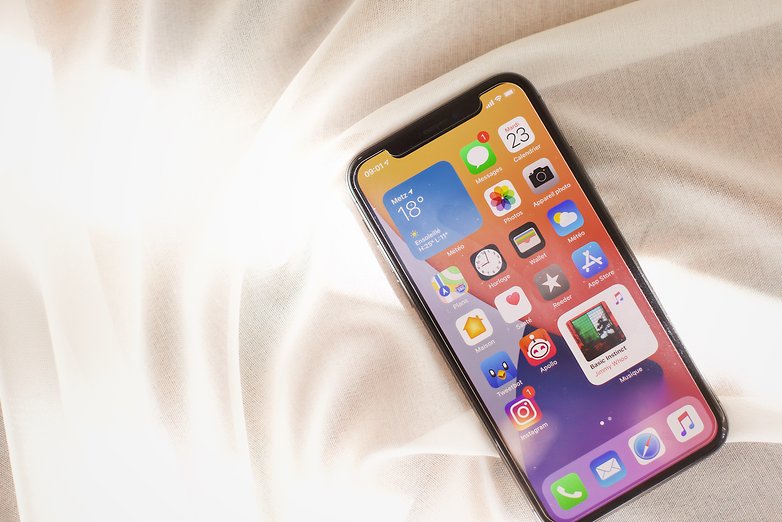
I'm just teasing you, calm down. The fact is, Apple has really worked hard to make its interface less rigid and more intuitive. The app library is also a very good addition as is the ability to set third-party apps as default apps.
Android 11 has improved a lot on data protection and privacy with an even more powerful permissions manager (unique permissions for some apps). It's not as advanced as iOS, which literally tipped the balance of power between users and GAFAM upside down, but it's already very good. The more complete quick menu and the extreme customization of notifications are also very nice additions.
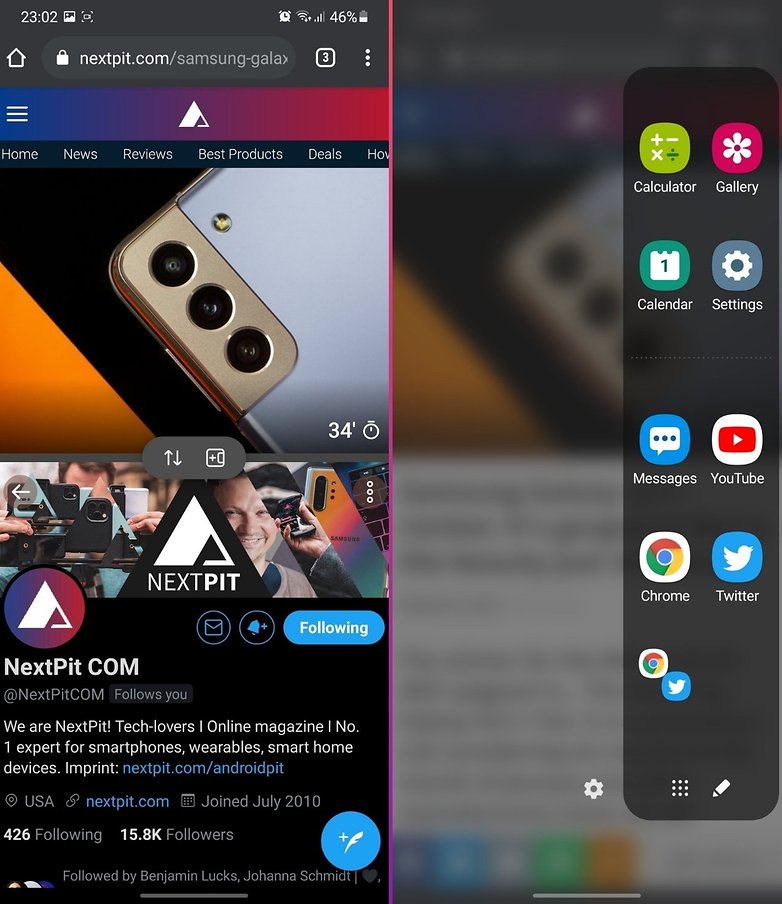
And Samsung's OneUI 3 that based on Android 11, takes the bulk of Android 11's additions while optimizing what Samsung has already been doing very well on its previous versions. We can mention this in particular: the multitasking and multi-window that can be optimized for your daily use are more fluid than what iOS offers.
This section alone deserves a dedicated article up to several thousand words in length, hence I'll stop here. The two OSes are gradually getting similar to one another in select aspects. However, they remain fundamentally different in their philosophy, though.
Conclusion
The advantages of Samsung over Apple:
- More customizable user interface.
- More advanced optimization for multitasking.
Apple's advantages over Samsung:
- Smooth experience within the Apple ecosystem.
- Very high degree of data protection.
- High-quality native applications.
- Clear and uncluttered design.
iPhone or Samsung: The update policy
This is the biggest difference between iPhones and Android smartphones that continue to be ignored by the average consumer. iPhones generally receive updates for 5 years and all models involved receive the update at almost the same time.
Apple's update policy
According to Apple's official page, we can see that the latest iOS 14.6 version is available all the way to the iPhone 6s/Plus which was released in 2015. These models have received 5 new iOS versions since their launch (not counting the version present by default at release). No Android manufacturer offers such extensive software maintenance.
The graph below illustrates this discrepancy quite well, although the methodology used to count the duration of software maintenance is erroneous. Indeed, the graph assumes that one year is equivalent to one update. This works for iPhones since each new model is released at the same time as each new (major) version of iOS rolls out. But for Samsung, its flagships are launched at the beginning of the year with the previous year's Android version and then updated in the same year once the new Android version is released.

Samsung's update policy
Since the Galaxy S10 and the launch of OneUI in 2019, Samsung has made huge strides when it comes to updates. Most Android manufacturers are content with offering 2 versions of Android and 3 years of security patches that become less and less frequent as time goes by.
For its latest flagships, the Samsung Galaxy S21 included, the manufacturer is promising to provide 3 major OS updates, which means that these smartphones should be eligible to receive Android 14 in 2023. This promise mainly concerns the high-end but is not limited to just those handsets. Even mid-range models such as the Samsung Galaxy A52 and A72 should receive 3 versions of Android.
Back in February, Samsung also announced that all its smartphones launched after 2019 will now receive 4 years of security updates. Mind you, this doesn't mean you'll get a monthly patch for 4 years. Rather, according to Samsung's official page, you should expect monthly patches for the first 2 years, quarterly patches in the third year, and bi-annual patches in the final year.
Again, the situation is rather chaotic and arbitrary. For example, the Samsung Galaxy A52 5G is currently listed in the list of smartphones that receive monthly patches. But the Galaxy A72, although more expensive and launched almost at the same time this year, receives only quarterly patches at the moment.
Conclusion
There aren't really any pros or cons here since Apple's update policy is simply better than Samsung's. But, it should also be noted that Samsung is the best example among all Android manufacturers.
iPhone or Samsung: Data protection
Apple once again holds a certain lead over Android manufacturers in this aspect. But the situation is not as clear-cut as it was in the past. And by the past, I mean just a couple of years ago. Samsung has benefited greatly from the security advances Google made on Android.
When it comes to security, the number of criteria to consider is far too vast to cover within the scope of this article. That's why I've limited myself to just the privacy and security features of each manufacturer.
Samsung's privacy features
With OneUI 3, Samsung has integrated the new privacy features of Android 11 into its handsets. The first of these is the one-time permissions system that you can grant or not grant to apps on your smartphone. So, you can allow an app to access your location, microphone or camera only once, or each time you launch the app in question.
The fact that you don't have to enable geolocation in the background right away is also an advantage. From now on, you have to do it from the page dedicated to the app in question from the system settings. These are additional steps that supposedly discourage or at least make you think twice before letting an application track you even when you're not using it.
Scoped storage (launched on Android 10), which allows you to compartmentalize the data as to which different applications are able to access, with one application being unable to access the other's silo and vice versa. In practical terms, this limits app access to just a few folders in internal storage, so your apps cannot check out the rest of your files.
When it comes to file managers, One UI 3.0 has a new "Access all files" permission, which allows them to function as in previous versions. However, the application must meet certain conditions to obtain this permission. All other applications are limited to "Media Access Only".
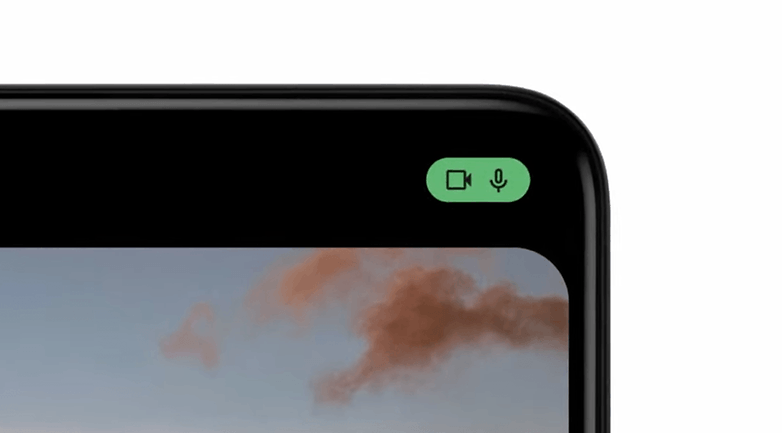
Apple's privacy features
The main addition of iOS 14, or rather iOS 14.5, is the famous ATT or App Tracking Transparency aimed at strictly limited third-party and native apps' access to your personal data.
ATT allows you to control which apps can and cannot track what you do on your iPhone, you can enable a setting that will ask you if an app wants to track you. Of course, apps that don't ask for your permission can still track you, but this setting at least gives you a heads-up.
iOS also offers permission options for your mic, camera, and geolocation and did so long before Android followed its footsteps. For geolocation, you also have the option to share your location but only approximately.
iOS lets you see if any of your saved passwords are corrupted, too weak, or are potentially vulnerable. Another interesting feature is that the Safari web browser notifies you of tracking across multiple sites or domains, cross-site tracking, and allows you to block said trackers. You can then access a report directly through Safari that shows you the number of trackers blocked for each site.
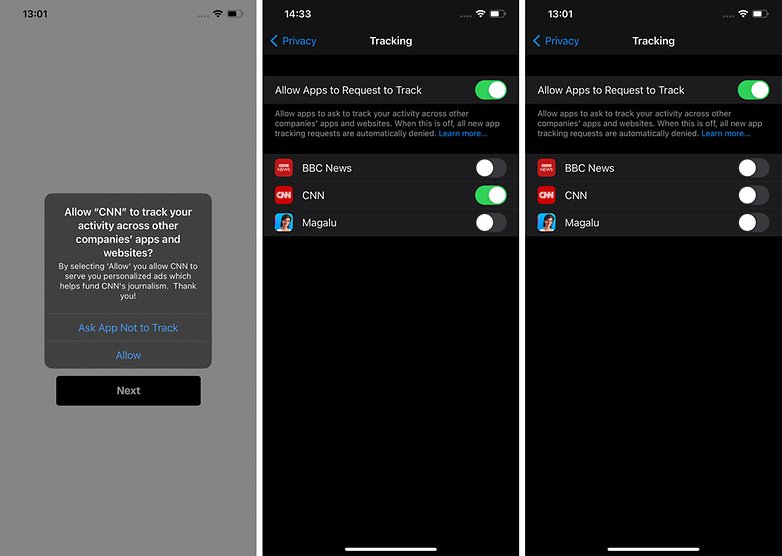
Conclusion
iOS and Android/OneUI have come a long way when it comes to data protection. Manufacturers understand that more and more users value their personal data and are making it a purchase criterion for their new smartphones.
In any case, no matter how much control an interface gives you over your data, the level of threat depends on factors beyond your control, such as the irregularity of updates and the ease and speed with which hackers can exploit such vulnerabilities.
Apple offers more frequent and regular updates for all its devices, a closed ecosystem that is harder to penetrate, and an app store with a stricter verification process. All these factors are still missing in Android. While the balance of power is not as lopsided as it once was, Apple is still a step above in this regard.
iPhone or Samsung: Resale price
This is a key criterion to consider when buying a smartphone. Generally, an average user renews his smartphone once every 2-3 years. Reselling your old smartphone to finance the purchase of a new one is obviously a common practice. But the fact is, Android smartphones depreciate much faster than iPhones.
According to a study commissioned and published last January by Bankmycell, Android smartphones shed an average of more than 33% of their value in 2020, compared to about 16% for iPhones. This decline accounts for over 50% of its price for a mid-range/entry-level smartphone.
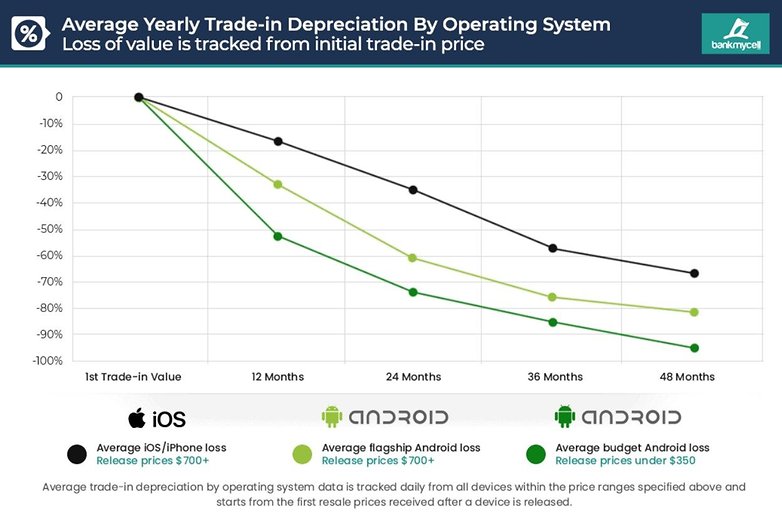
There are many reasons for the faster depreciation of Android handsets than Apple's. Take Samsung for example. The manufacturer launches more than 10 smartphones each year. In 2020, Apple released only 5 smartphones. Samsung's most affordable models are meant to be renewed more frequently, ideally every year if the manufacturer wants to maximize its sales.
If people resell their smartphones sooner, it's normal for them to lose their value faster. If you want to renew your iPhone, you'll have to wait for a longer period of time since Apple only launches a new range once a year on average. As iPhones are more expensive than their Android counterparts, it is normal that Apple users keep their iPhone longer and resell it at the most convenient time.
It's the same principle as Hodl, of which many cryptocurrency fanboys subscribe to at this moment - keeping your assets with you no matter how the market fluctuates, especially when the value drops. As long as everyone is holding, everything will be fine.
Conclusion
Samsung's advantages over Apple:
- Ability to find smartphones at a better price only a few months after their release.
- Flagships experience significant price drops, unlike the iPhone.
- The second hand market forces e-tailers to offer regular promotions.
Advantages of Apple compared to Samsung:
- Possibility to resell your iPhone at a good price one or two years after purchase.
- Makes it easier to buy a new iPhone.
So, for those of you who read this article to the end, I hope that these elements of comparison between Apple and Samsung were useful to you. Feel free to give me feedback about this format, tell me what you think or if you would like to have this kind of guide but for other brands. I've tried to be as comprehensive as possible without writing a 50-page book either, but if I've missed something critical or made a mistake, do let me know in the comments.
Read More Open link https://ift.tt/3uDGsng
0 Response to "iPhone or Samsung: Which smartphone should you choose in 2021?"
Posting Komentar